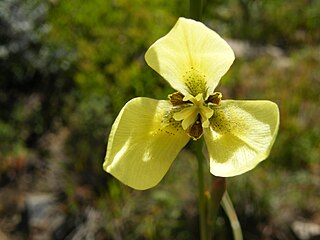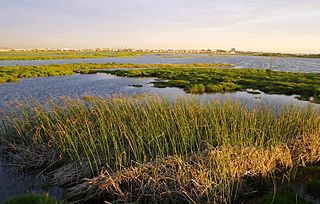
Dietes is a genus of rhizomatous plants of the family Iridaceae, first described as a genus in 1866. Common names include wood iris, fortnight lily, African iris, Japanese iris and butterfly iris, each of which may be used differently in different regions for one or more of the six species within the genus.

Ceropegia stapeliiformis is a flowering plant in the genus Ceropegia (Apocynaceae), native to South Africa and Eswatini. Common names include serpent ceropegia, snake creeper, and slangkambro.

Moraea, the Cape tulips, is a genus of plants in the family Iridaceae, first described as a genus in 1758. The group is widespread across Africa, the Mediterranean, and central and southwestern Asia. The genus name is a tribute to the English botanist Robert More.

The West Coast National Park lies 88 km (55 mi) north of Cape Town in the Western Cape province of South Africa. The park is found inside of the Cape West Coast Biosphere Reserve, part of the UNESCO Man and the Biosphere Programme. It is bordered by the Atlantic Ocean on the west and the R27 coastal road, and runs from the town of Yzerfontein in the south, up to the Langebaan Lagoon. The park is particularly well known for its bird life and for the spring flowers which occur in the months from August to September, especially in the Postberg flower reserve section of the park. The park, with the islands in Saldanha Bay, has been identified by BirdLife International as an Important Bird Area. The park was proclaimed in 1985, and is 36,259.8 hectares (140.000 sq mi) in size.

Moraea bellendenii is a species of plant in genus Moraea that was named after John Bellenden, the English botanist.

Moraea bituminosa is a species of the genus Moraea in family Iridaceae.

Miriam Phoebe de Vos was a leading South African botanist and academic. She was an expert on bulbous plants, especially Romulea. She also had a special interest in Moraea and Clivia.

Moraea collina is a species of the genus Moraea, in the family Iridaceae. It was formerly known as Homeria collina.

The Rietvlei Wetland Reserve is a 663-hectare (1,640-acre) nature reserve situated in Table View, Western Cape, South Africa. It is managed by the City of Cape Town's Environmental Resource Management Department.

Peninsula Shale Renosterveld (PSR) is a unique vegetation type that is found only on the slopes of Signal Hill and Devil's Peak in Cape Town, South Africa. It is critically endangered and exists nowhere else.

Moraea aristata is a species of flowering plant in the family Iridaceae. It is referred to by the common names blue-eyed uintjie or Blouooguintjie in Afrikaans.It is endemic to the city of Cape Town and is considered to be critically endangered.

Swartland Shale Renosterveld is a critically endangered vegetation type of the Western Cape, South Africa.

Moraea flaccida commonly known as the one-leaf Cape tulip, is a bulb native to South Africa, including in Fynbos habitats. Despite its common name, this species is not a tulip (Liliaceae) but it rather belongs to the family Iridaceae.

Moraea gawleri is a species of plant in the family Iridaceae. The majority of its range lies around Western Cape province of South Africa, however it has also been recorded as far as Namaqualand to Humansdorp in the surrounding provinces.

Moraea macronyx is a species of plant in the family Iridaceae. It is found in Western Cape, South Africa.

Moraea tricolor is a species of plant in the family Iridaceae. It is found in Western Cape, South Africa.

Moraea gigandra is a species of plant in the family Iridaceae. It is a tuberous geophyte endemic to the southwestern Cape Provinces of South Africa.
Peter Goldblatt is a South African botanist, working principally in the United States.

Moraea polystachya is a species of plant in the family Iridaceae native to southern Africa.

Roepera morgsana is a succulent plant species in the genus Roepera. It is endemic to Namibia and the Cape Provinces of South Africa.




















